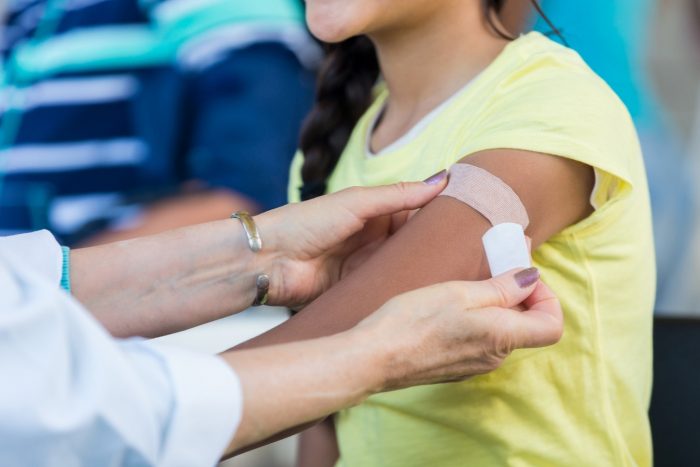Dr. Annika Hofstetter and Dr. Matthew Kronman spoke with On the Pulse to answer questions parents may have about the flu vaccine this year.

Who should get a flu shot?
Hofstetter: Everyone who is age 6 months or older should get their annual flu vaccine.
When is the best time to get a flu shot?
Hofstetter: We recommend that everyone get their flu vaccine as early as possible. Ideally, by the end of October, we’d like everyone to be vaccinated. That being said, there is no bad time to get the flu vaccine, so we continue to vaccinate throughout the entire season, which includes anytime from now through typically April or May.
What are the biggest benefits of getting a flu vaccination?
Kronman: It’s been shown to prevent death and hospitalization and people getting sick from flu or needing to go to the doctor, or even miss school or work. It really can prevent a wide range of the illnesses we see due to influenza, ranging from milder illness all the way to death.
Hofstetter: The flu vaccine is the most effective tool we have to prevent the flu and flu-associated complications. Getting the flu vaccine will not only help prevent you from getting the flu, but potentially very serious complications such as hospitalization or even death. If patients or families have particular questions or concerns about the flu vaccine, I strongly encourage them to talk to their child’s provider.
Last year, flu cases declined dramatically – what impact could that have on the flu this year?
Hofstetter: There are a couple of reasons why we really want to focus on our flu vaccination efforts this season. First, given the ongoing COVID-19 pandemic, we should do as much as we can to prevent flu cases in order to avoid further overwhelming our healthcare system.
In addition, because of our COVID-19 mitigation measures last season, we saw fewer cases of flu. However, over the summer months, as we let up on some of those measures – masking less, social distancing less – we saw a significant rise in circulation of other respiratory viruses. The concern is that we may see the same with flu this season. Also, because fewer people were exposed to flu last season, we have decreased population-level immunity, which leaves us more vulnerable to flu.
Does a COVID-19 vaccine protect you against the flu? If not, can you get a flu vaccine and COVID-19 vaccine at the same time?
Kronman: A COVID vaccine does not protect you against the flu. You can get a COVID vaccine and the flu vaccine at the same time if you are eligible!
Hofstetter: There is no interaction between the two vaccines. The flu vaccine is not going to protect you against COVID-19 and vice versa.
You can definitely get both vaccines at the same time, so if the opportunity arises, then that is what we would recommend. If your child is eligible to get the flu vaccine now, we would recommend doing that now and then, if and when the COVID vaccine becomes available for your child, we recommend doing that at that point.
What else should people know about the flu vaccine?
Kronman: With an ongoing coronavirus pandemic and with the easing of a lot of those societal clampdowns like physical distancing, masking, and so on, it’s especially important to get it – because we really want to try and prevent illness from both flu and COVID-19 if we can.
Hofstetter: Because we had so few cases of the flu last season, I worry that people will be less inclined to think they need the flu vaccine for this upcoming season. The flu is very unpredictable in terms of its severity and duration each season, so we want to do the most we can to prevent the flu in our patients, families, and community.
Resources
Frequently Asked Influenza (Flu) Questions: 2021-2022 Season (CDC)
People at Higher Risk of Flu Complications (CDC)
Similarities and Differences between Flu and COVID-19 (CDC)

